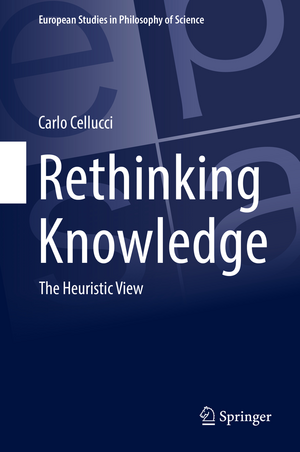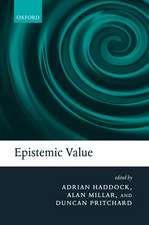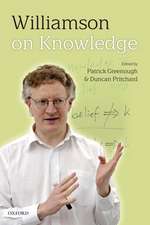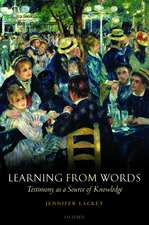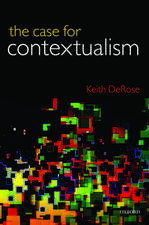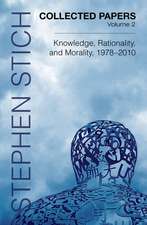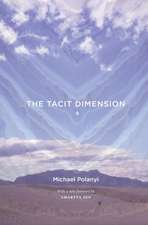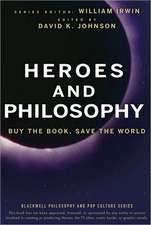Rethinking Knowledge: The Heuristic View: European Studies in Philosophy of Science, cartea 4
Autor Carlo Celluccien Limba Engleză Hardback – 7 apr 2017
The author argues that from its very beginning philosophy has focused on knowledge and methods for acquiring knowledge. This view, however, has generally been abandoned in the last century with the belief that, unlike the sciences, philosophy makes no observations or experiments and requires only thought. Thus, in order for philosophy to once again be relevant, it needs to return to its roots and focus on knowledge as well as methods for acquiring knowledge.
Accordingly, this book deals with several questions about knowledge that are essential to this view of philosophy, including mathematical knowledge. Coverage examines such issues as the nature of knowledge; plausibility and common sense; knowledge as problem solving; modeling scientific knowledge; mathematical objects, definitions, diagrams; mathematics and reality; and more.
This monograph presents a new approach to philosophy, epistemology, and the philosophy of mathematics. It will appeal to graduate students and researchers with interests in the role of knowledge, the analytic method, models of science, and mathematics and reality.
| Toate formatele și edițiile | Preț | Express |
|---|---|---|
| Paperback (1) | 586.94 lei 6-8 săpt. | |
| Springer International Publishing – 18 aug 2018 | 586.94 lei 6-8 săpt. | |
| Hardback (1) | 734.49 lei 6-8 săpt. | |
| Springer International Publishing – 7 apr 2017 | 734.49 lei 6-8 săpt. |
Preț: 734.49 lei
Preț vechi: 895.71 lei
-18% Nou
Puncte Express: 1102
Preț estimativ în valută:
140.67€ • 144.93$ • 117.84£
140.67€ • 144.93$ • 117.84£
Carte tipărită la comandă
Livrare economică 25 februarie-11 martie
Preluare comenzi: 021 569.72.76
Specificații
ISBN-13: 9783319532363
ISBN-10: 3319532367
Pagini: 436
Ilustrații: XIX, 427 p. 34 illus.
Dimensiuni: 155 x 235 x 25 mm
Greutate: 0.8 kg
Ediția:1st ed. 2017
Editura: Springer International Publishing
Colecția Springer
Seria European Studies in Philosophy of Science
Locul publicării:Cham, Switzerland
ISBN-10: 3319532367
Pagini: 436
Ilustrații: XIX, 427 p. 34 illus.
Dimensiuni: 155 x 235 x 25 mm
Greutate: 0.8 kg
Ediția:1st ed. 2017
Editura: Springer International Publishing
Colecția Springer
Seria European Studies in Philosophy of Science
Locul publicării:Cham, Switzerland
Cuprins
1. Introduction.- 2. The Heuristic View.- 3. The Foundationalist View.- 4. The Limits of Skepticism.- 5. Philosophy and the Humanistic Disciplines.- 6. The Nature of Knowledge.- 7. Knowledge to Reality.- 8. Knowledge and Truth.- 9. Knowledge, Plausibly, and Common Sense.- 10. Other Questions About Knowledge.- 11. A Discourse on Method.- 12. The Method of Knowledge.- 13. Knowledge as Problem Solving.- 14. Modeling Scientific Knowledge.- 15. Perceptual Knowledge.- 16. Knowledge and Error.- 17. Knowledge and Mind.- 18. The Nature of Mathematical Knowledge.- 19. Mathematical Objects, Definitions, Diagrams.- 20. Mathematics: Problem Solving or Theorem Proving?.- 21. Two Notions of Mathematical Demonstration.- 22. Mathematical Explanations.- 23. Mathematical Beauty.- 24. Mathematics and Reality.- 25. Conclusion.
Notă biografică
Carlo Cellucci is Emeritus Professor of Philosophy at Sapienza University of Rome, Italy. His recent publications include the book Rethinking Logic: Logic in Relation to Mathematics, Evolution, and Method, Springer 2013, and the papers “Top-Down and Bottom-Up Philosophy of Mathematics”, “Philosophy of Mathematics: Making a Fresh Start”, “Why Should the Logic of Discovery be Revived”, “Does Logic Slowly Pass Away, or Has It a Future?”, “Rethinking Knowledge”, “Is There a Scientific Method? The Analytic Model of Science”, “Theory Building as Problem Solving”.
Textul de pe ultima copertă
This monograph addresses the question of the increasing irrelevance of philosophy, which has seen scientists as well as philosophers concluding that philosophy is dead and has dissolved into the sciences. It seeks to answer the question of whether or not philosophy can still be fruitful and what kind of philosophy can be such.
The author argues that from its very beginning philosophy has focused on knowledge and methods for acquiring knowledge. This view, however, has generally been abandoned in the last century with the belief that, unlike the sciences, philosophy makes no observations or experiments and requires only thought. Thus, in order for philosophy to once again be relevant, it needs to return to its roots and focus on knowledge as well as methods for acquiring knowledge.
Accordingly, this book deals with several questions about knowledge that are essential to this view of philosophy, including mathematical knowledge. Coverage examines such issues as the nature of knowledge; plausibility and common sense; knowledge as problem solving; modeling scientific knowledge; mathematical objects, definitions, diagrams; mathematics and reality; and more.
This monograph presents a new approach to philosophy, epistemology, and the philosophy of mathematics. It will appeal to graduate students and researchers with interests in the role of knowledge, the analytic method, models of science, and mathematics and reality.
The author argues that from its very beginning philosophy has focused on knowledge and methods for acquiring knowledge. This view, however, has generally been abandoned in the last century with the belief that, unlike the sciences, philosophy makes no observations or experiments and requires only thought. Thus, in order for philosophy to once again be relevant, it needs to return to its roots and focus on knowledge as well as methods for acquiring knowledge.
Accordingly, this book deals with several questions about knowledge that are essential to this view of philosophy, including mathematical knowledge. Coverage examines such issues as the nature of knowledge; plausibility and common sense; knowledge as problem solving; modeling scientific knowledge; mathematical objects, definitions, diagrams; mathematics and reality; and more.
This monograph presents a new approach to philosophy, epistemology, and the philosophy of mathematics. It will appeal to graduate students and researchers with interests in the role of knowledge, the analytic method, models of science, and mathematics and reality.
Caracteristici
Presents a new approach to philosophy, epistemology, and the philosophy of mathematics Addresses the question of the increasing irrelevance of philosophy Revives the view that philosophy can still be fruitful
